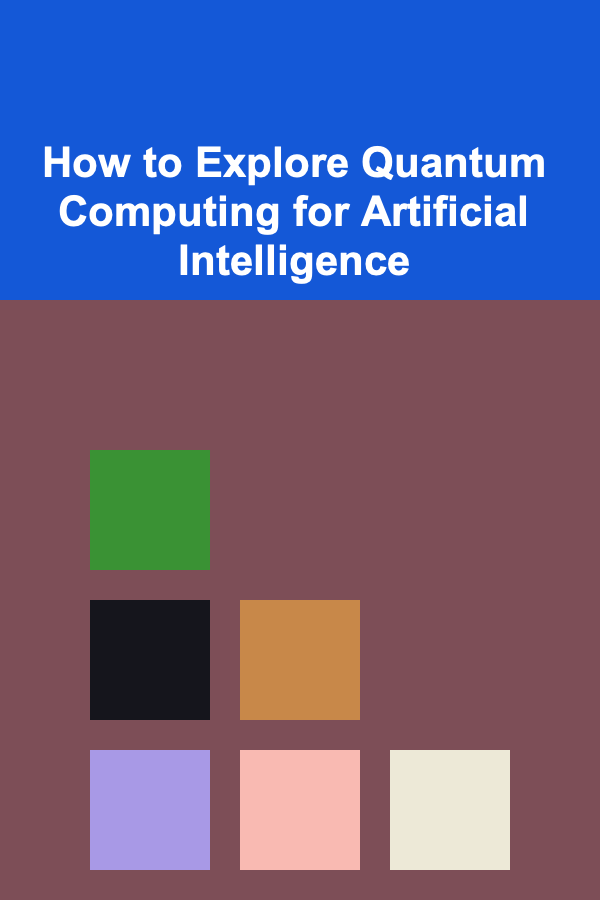
How to Explore Quantum Computing for Artificial Intelligence
ebook include PDF & Audio bundle (Micro Guide)
$12.99$7.99
Limited Time Offer! Order within the next:

Quantum computing and Artificial Intelligence (AI) are two of the most exciting fields in modern science and technology. Both fields promise to revolutionize industries and redefine what is possible in computation. Quantum computing, with its unparalleled processing power, could vastly enhance the capabilities of AI, unlocking new potential for solving problems that are currently beyond the reach of classical computers. This article explores how one can dive into quantum computing and its potential intersection with AI, focusing on both theoretical foundations and practical applications.
Introduction to Quantum Computing
What is Quantum Computing?
At the core of quantum computing is the principle of quantum mechanics, which governs the behavior of particles at the smallest scales, such as electrons and photons. Unlike classical computers, which rely on bits to represent data in binary form (0s and 1s), quantum computers use quantum bits or qubits . Qubits can exist in a superposition of both 0 and 1 simultaneously, enabling quantum computers to perform many calculations at once. Additionally, qubits can become entangled, meaning the state of one qubit is directly related to the state of another, regardless of the distance between them.
These fundamental properties allow quantum computers to solve certain problems exponentially faster than classical computers. While classical computing excels at problems involving straightforward algorithms and operations, quantum computing can address complex problems that would take classical computers years or even centuries to solve. This includes tasks such as factoring large numbers, simulating quantum systems, and optimizing complex processes.
How Does Quantum Computing Work?
Quantum computing harnesses a few key concepts from quantum mechanics:
- Superposition: Classical bits can only be in one of two states (0 or 1) at any given time. In contrast, qubits can exist in multiple states simultaneously. This allows quantum computers to explore many potential solutions in parallel, speeding up computations for certain tasks.
- Entanglement: When qubits become entangled, the state of one qubit can instantly affect the state of another, even if they are far apart. This non-local property of qubits can be leveraged to solve problems in novel ways, allowing quantum algorithms to perform tasks that are impossible for classical algorithms.
- Interference: Quantum interference is used to amplify the correct answers and cancel out incorrect ones. Through careful manipulation of qubits, quantum algorithms can enhance the likelihood of obtaining the correct solution by reinforcing certain pathways in the computation while reducing others.
The Quantum Advantage
Quantum computing is not simply a faster version of classical computing. It offers a quantum advantage for specific types of problems. This advantage lies in the ability of quantum computers to efficiently handle calculations involving huge datasets, complex variables, or probabilistic outcomes. In contrast, classical computers struggle with these tasks, especially as the size of the problem increases. Quantum computing can offer exponential speedups for certain problems, such as factoring large numbers, simulating molecular interactions, or solving optimization problems.
Introduction to Artificial Intelligence
What is Artificial Intelligence?
Artificial Intelligence refers to the creation of machines or software that can perform tasks that would normally require human intelligence. This includes activities such as reasoning, problem-solving, language processing, image recognition, and decision-making. AI systems are powered by algorithms that allow them to analyze data, learn from experience, and make predictions or decisions without explicit human programming.
AI can be broadly classified into two types:
- Narrow AI: This is specialized AI that is designed to perform a specific task, such as facial recognition, language translation, or playing a game. It operates within a set of predefined parameters and is highly efficient at the task it is designed for.
- General AI: Also known as Artificial General Intelligence (AGI), this is a more advanced form of AI that has the ability to perform any intellectual task that a human can do. AGI is still theoretical and has not yet been achieved.
The Role of Machine Learning and Deep Learning
Machine learning (ML) is a subset of AI that allows systems to learn from data without being explicitly programmed. ML algorithms analyze large datasets and identify patterns to make predictions or decisions. A subfield of machine learning, deep learning, uses neural networks with multiple layers to model complex patterns in data. Deep learning has been particularly successful in areas like image recognition, natural language processing, and autonomous systems.
Challenges in AI
While AI has made significant strides in recent years, there are still major challenges to overcome, including:
- Data Dependency: AI models require vast amounts of labeled data to train effectively. This dependency on large datasets can limit the practical application of AI in certain domains, especially when data is scarce or difficult to obtain.
- Computational Power: Training AI models, especially deep learning networks, requires significant computational resources. Traditional computers may struggle to handle the scale of data and processing power needed for state-of-the-art AI.
- Interpretability: Many AI systems, particularly deep learning models, operate as "black boxes." This means their decision-making processes are not always transparent, making it difficult to understand how they arrive at specific conclusions.
The Intersection of Quantum Computing and AI
Quantum computing has the potential to address some of the challenges facing AI. By leveraging quantum mechanical principles, quantum computers could significantly accelerate AI tasks, including data analysis, optimization, and model training. Let's explore how quantum computing could enhance various aspects of AI.
Speeding Up Machine Learning
One of the most promising applications of quantum computing for AI is speeding up machine learning algorithms. Traditional machine learning algorithms can be computationally expensive, especially when dealing with large datasets or complex models. Quantum computing offers the possibility of solving certain machine learning problems exponentially faster.
For example, quantum-enhanced machine learning algorithms have been proposed that leverage quantum computing to improve optimization, clustering, classification, and regression tasks. Quantum algorithms such as quantum support vector machines (QSVMs) and quantum neural networks (QNNs) are already being explored to enhance machine learning.
Quantum Support Vector Machines (QSVM)
Support vector machines (SVMs) are popular classical algorithms used for classification and regression tasks. Quantum computing can improve SVMs by using quantum superposition to analyze data more efficiently. QSVMs could handle larger datasets in less time and potentially provide better classification accuracy than classical counterparts.
Quantum Neural Networks (QNNs)
Neural networks are a key component of deep learning. Quantum neural networks (QNNs) are a hybrid approach that combines classical neural networks with quantum computing principles. These networks use quantum gates and quantum circuits to enhance the training and performance of neural networks, offering the potential for faster convergence and better generalization.
Quantum Computing for Optimization Problems
AI and machine learning often involve solving optimization problems, such as finding the best configuration of parameters or selecting the most relevant features from a large dataset. Optimization problems are usually NP-hard, meaning they become exponentially harder to solve as the size of the problem increases. Quantum computing can provide exponential speedups in solving certain optimization problems using algorithms like Quantum Approximate Optimization Algorithm (QAOA).
The QAOA uses quantum superposition and interference to explore a large number of possible solutions simultaneously, allowing quantum computers to solve optimization problems more efficiently than classical computers. This could have a significant impact on AI, particularly in fields such as logistics, finance, and drug discovery, where optimization plays a crucial role.
Quantum Computing in Natural Language Processing (NLP)
Natural Language Processing (NLP) is a subfield of AI that focuses on enabling machines to understand and generate human language. Quantum computing could accelerate certain NLP tasks, such as sentiment analysis, machine translation, and language generation, by leveraging quantum algorithms that enhance data processing capabilities.
Quantum NLP techniques could provide better performance in tasks that involve large-scale text data, such as document clustering and topic modeling. Additionally, quantum computing could improve the efficiency of training large language models, which require vast computational resources.
Solving the Interpretability Problem
One of the major challenges in AI is the lack of interpretability in machine learning models. Quantum computing has the potential to enhance the transparency of AI systems by providing better methods for understanding and explaining how AI models make decisions. Quantum techniques such as quantum walks and quantum games could enable more interpretable machine learning models, helping to increase trust and transparency in AI systems.
Quantum Data and Quantum Machine Learning
A more speculative area of research is quantum data. Quantum computers can process and store quantum data in a way that classical computers cannot. This could lead to the development of new types of machine learning algorithms that can learn from quantum data. Additionally, hybrid quantum-classical systems could be used to enhance machine learning by using quantum resources to improve classical models.
Practical Approaches to Exploring Quantum Computing for AI
To explore quantum computing for AI, one must have a strong understanding of both fields. Here are a few practical steps one can take to get started:
- Learn the Basics of Quantum Computing: Begin by familiarizing yourself with the principles of quantum mechanics and quantum computing. There are several online courses, textbooks, and tutorials available to help you build a solid foundation in this field.
- Get Hands-On Experience : Several companies and research institutions are providing access to quantum computers via cloud platforms. IBM's Qiskit , Google's Cirq , and Microsoft's Quantum Development Kit are some popular frameworks that allow you to experiment with quantum circuits and algorithms.
- Explore Quantum Machine Learning: Look for research papers and resources that focus on quantum machine learning (QML). Many universities and online platforms offer courses that delve into this intersection of quantum computing and AI.
- Join the Quantum Community: Engage with the quantum computing community by attending conferences, workshops, and online forums. This will help you stay up to date with the latest research and advancements in the field.
- Collaborate with Experts: Quantum computing is a highly specialized field that requires expertise in both quantum mechanics and computer science. Consider collaborating with quantum researchers or joining research groups that focus on quantum-enhanced AI.
Conclusion
The combination of quantum computing and artificial intelligence holds immense potential for reshaping the future of computation. By leveraging the unique properties of quantum mechanics, quantum computing can accelerate AI, enabling faster, more efficient machine learning models and solving problems that are currently intractable for classical computers. As the field of quantum computing continues to evolve, it is essential for AI researchers and enthusiasts to explore this exciting frontier, learn the fundamentals of quantum mechanics, and stay engaged with the rapidly advancing research. The convergence of these two transformative technologies could redefine the boundaries of what is possible in both computation and artificial intelligence.

How to Earn Money with Deep Learning Through Freelancing
Read More
How to Improve Your Ultimate Economy in Team-Based Games
Read More
How to Set Up a Savings Plan for Your Child's Education
Read More
How to Set Up a Travel Emergency Plan
Read More
How to Soundproof an Existing Home Without Major Renovations
Read More
How to Train Your Pet to Stay Out of Certain Rooms
Read MoreOther Products

How to Earn Money with Deep Learning Through Freelancing
Read More
How to Improve Your Ultimate Economy in Team-Based Games
Read More
How to Set Up a Savings Plan for Your Child's Education
Read More
How to Set Up a Travel Emergency Plan
Read More
How to Soundproof an Existing Home Without Major Renovations
Read More